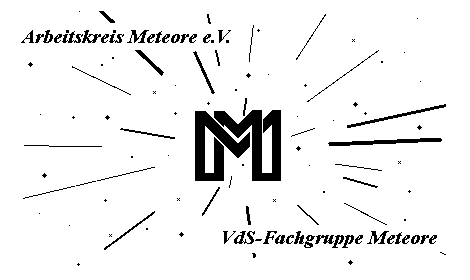Preparing presentations: lectures and posters
We intend to prepare a program before the IMC starts. Usually, participants bring further presentations and latest results on a kind of last minute contribution. However, we would like you to indicate a topic or headline of your contribution (talk, poster) already when you register for the IMC. This makes it easier for the organizers on the one hand, but may be also more attractive for people who have not yet decided to attend the IMC. It could also let participants think about bringing extra (raw, unpublished or preliminary) data and material if a specific topic is announced. (Of course, this is always recommended, as discussions may yield new aspects and views on results and data.)The headlines listed in the schedule below are just a first attempt to group contributions and are by no means a final program structure. Speakers are also asked to prepare their presentations for the Proceedings (further hints will follow).
Last but not least: this IMC marks the 15th anniversary of founding the IMO. Hence it would also be a good idea to bring "old" photos etc.
Below we list the topics announced by now. Currently, this is an alphabetic list...
General schedule (preliminary program)
- Thursday, 18 September 2003
Late afternoon & evening: arrival and registration
Welcome reception and some short (rather informal) presentations - please bring slides and perhaps short films etc. - Friday, 19 September 2003
Morning session: Meteor showers - observational results
Afternoon: Excursion to the Museum of Natural History, Berlin; lecture on meteorites and tour through the meteorite collection guided by Prof. Dieter Stöffler
Evening: Workshops - Saturday, 20 September 2003
Morning session: Observing techniques, methods and results
11-12: Poster session
14-15: IMO General Assembly
Afternoon session: Projects and programs
Evening: Barbecue and campfire (weather permitting) - Sunday, 21 September 2003
Morning session: Unique events
Farewell...
Announced contributions
as of September 11; oral presentations (O) and posters (P)- Rainer Arlt: Leonids 1998-2002 - five different outbursts (O)
- Margaret Campbell-Brown: Detailed model of meteor ablation from light curve studies (O)
- Margaret Campbell-Brown: Computer program demonstration (meteor ablation)
- Jorge Diaz: Presentation of the MOTS software (meteor orbit calculation) (O)
- Daniel Fischer: "Five wild years" - a personal look back at the great Leonid experience (O)
- Andrei Dorian Gheorghe: Meteor poetry dramas played in Romania (O)
- Valentin Grigore: 2003 summer meteor observations in Romania (O)
- Valentin Grigore: Spiral structure of persistent Leonid trains, photos
made in Romania (P)
- Valentin Grigore: Images from IMCs 1992-2002 (P)
- Axel Haas: Impact structures (P)
- Tomislav Jurkic: Parallel radio, video and visual observations of Perseid meteor
stream in 2003 (O+P)
- Javor Kac: Observations of the 2002 Leonids by the MBK team (O)
- Andre Knöfel: The IMO between Mars and Jupiter (O)
- Detlef Koschny: Meteor observations from space - current ideas (P)
- Detlef Koschny: The ESA Leonid 2002 campaign to Spain (O)
- Maria Krumova: Summer observations of astroclub Canopus - photos (P)
- Kayo Miyao: Search for the characteristics of meteor showers
from multi-frequency radio observation (P)
- Jos Nijland & Casper terKuile: DMS Leonid 2002 observations in Spain (O)
- Nagatoshi Nogami: Meteorite fall list from ancient Chinese records (O)
- Jürgen Oberst: The European Fireball Network and the recovery of the Neuschwanstein meteorites
(German Aerospace Center, Berlin-Adlershof; invited talk)
- Hiroshi Ogawa: Radio meteor observation research program in Japan (P)
- Hiroshi Ogawa: An international project for radio meteor observation (O)
- Gelu-Claudiu Radu: TBD
- Gelu-Claudiu Radu, Valentin Grigore: Perseids 2003 event in Romania (P)
- Gelu-Claudiu Radu, Andrei Dorian Gheorghe: Sequences from the IMCs 2000-2002 (film)
- Jürgen Rendtel: Geminids: analysis of visual data from 50 years (O)
- Jürgen Rendtel: The population index of sporadic meteors throughout the year (O)
- Paul Roggemans: Amateur meteor astronomy in the 20th century (O)
- Galina O. Ryabova: New model of the Geminid meteoroid stream (O)
- Ulrich Sperberg: Meteorite craters in Europe (O)
- Yasuhiro Tonomura: Telescopic observations of the Leonids in 2001 and 2002 (P)
- Arnold Tukkers: The `Starfriends Foundation' (O)
- Jeremie Vaubaillon: What happened with the pi-Puppids in April 2003? (O)
- Valentin Velkov: Leonids 2002 from Avren village, Bulgaria (O)
- Erina Yanagida: Relationship between fireballs and HRO long echoes (P)
- Joe Zender: Data analysis of spectral video data (O)
- Joe Zender: Camera setup for meteor spectroscopy (P)
- Peter Zimnikoval: TV observations of meteors from the Aquarius region
in early August (O)
Astropoetry performance by Andrei Dorian Gheorghe, Gelu-Claudiu Radu and others
The IMC 2003 is organized by the Arbeitskreis Meteore / Fachgruppe Meteore

Other information
General information (main page)Berlin public transport
Berlin - Brandenburg railway connections
road information
Bollmannsruh - IMC location
preliminary list of participants
IMO Publications
During the IMC, all IMO publications will be available. We suggest to check your home library because some of the publications will be sold at reduced rates! Make use of this opportunity and prepare your list!
|